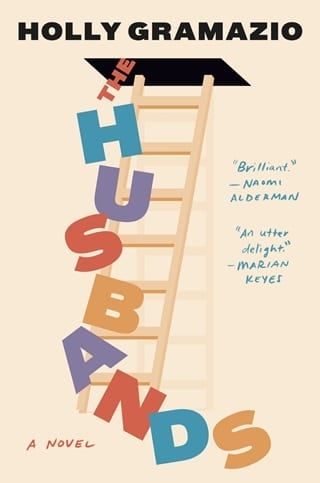Chapter 30
CHAPTER 30
Another husband descends.
She feels sad. She does feel sad, doesn't she? She puts down the lemon-and-honey drink and looks away and looks back and it's gone. And when she breathes in the air of the new flat, which has lost that smell which she thinks of as jute , the smell of only the best decisions, the sadness swells inside her and passes up her throat and then she breathes out and releases it. And when the husband turns around and is someone new, just some guy , she steps forward and kisses him lightly.
She keeps him for a few days, and then moves on, and then on again. If not Michael, then who? She is in this to find her forever husband, and not to dawdle; Bohai's walk-in wardrobe experience has renewed her determination. It's time to get to work.
One husband builds model trains, the spare room filled with a winding track, and she helps out, pinching little houses together while glue dries, debating the exact positioning of a tiny cat. She enjoys it for a day, then sends him back. One husband wears T-shirts under his buttoned-up shirts, and she liked it when Carter did it but it seems weird from someone English, or maybe it just reminds her of Carter too much. She sends him back as well.
With a late-February husband she finds crocuses coming up in her garden, and she relaxes her search for a while, resting in a world where someone bothered to plant bulbs in autumn. Over the course of a week the flowers crest the dirt and start to open. They're wonderful. But the husband himself is not to her taste; she moves on when the crocuses start to fade and she finds that nobody has planted daffodils for March.
One husband knits his own socks. One husband has a seemingly congenial coke habit which, she is shocked and a little excited to discover, she shares. She gives it a go, leaning forward and copying his movements, and she doesn't like it, but she doesn't exactly not like it either. A few days later, though, they go round to visit the husband's friend Padge and hang out, and after a few beers the husband asks Padge about what he's got in stock, and Padge goes to his freezer and pulls out a tub of supposed ice cream that he opens to shake out a cluster of plastic bags, and this is too much; she was willing to take drugs with the husband but she is absolutely not willing to sit with him while he buys them from a friend's empty carton of Sainsbury's Taste the Difference vanilla.
She likes the next husband, a slightly younger man called Petey, but two hours into his visit she is aghast to discover from a message she sent to Elena a couple of days ago that she, Lauren, is—somehow—pregnant. Elena's response reads Congratulations!!(??? right?) , and then it looks like they had a long, long phone call. The process can't be far gone and she can't figure out whether she's even told Petey or whether she's keeping it a secret and deciding what to do. There's no way the pregnancy was totally accidental; her IUD should still have two years left before she needs to replace it. She wants to work out how Petey convinced her to get it removed, what's going on, what she talked about with Elena on that long call, but not as much as she wants to not be pregnant any more; she's grown used to different hair colours, the occasional new scar, but this is too much. She sends Petey back, and then cycles through another three or four husbands right away, just in case.
More husbands arrive. She sends them back. Still more husbands arrive. She stops for a while with an Alasdair, because she likes his accent, a gentle Edinburgh lilt, and when they go to his friend's wedding and he puts on his kilt she's a big fan of that too. She is genuinely hurt when she figures out that he's having an affair.
It's worse in the next world. This husband, Hōne, is from Auckland, and she has a lovely evening with him watching, thank god, not Mindhunter or in fact any sort of drama that they're five episodes into and that she has to pretend to understand, but instead a sketch comedy show that requires neither attention nor background knowledge. But when she heads into work the next day, she discovers that, this time, she's the unfaithful one. At first, when her colleague at the canvas-stretching store touches her on the back in passing, she assumes he is simply a creep, but then they're alone at lunchtime and he grabs her hand and kisses her and says, "I missed you so much, I can't believe I hate weekends now." No. She doesn't like the idea of herself as the sort of person who might have an affair, and it's bad enough having to figure out her relations with one man, let alone two.
"Exactly," Bohai says, during one of his London visits. "Hence my rules, as you know."
"I really hated it," she says; she was surprised by how much. It's not like she doesn't lie to the husbands plenty. "What do you think when you find out you're up to something?"
"Well. Even before all this I made a lot of bad decisions, you know? Fun decisions. But bad. So it's almost easier when it's a different version of me that did it, right, because it's god why would he do that, the fucking idiot instead of why did I do that, what's wrong with me, shit. "
He's been very apologetic about the walk-in wardrobe incident, but it's not his fault, of course; even the eavesdropping was some other Bohai. And when she thinks that she could be doing yoga every morning and understanding spring greens and joining in on Tuesday book discussion Zooms and always, always eating at the table, she's not sorry to have moved on.
"So what you're saying," he says, "is: thank you, Bohai, I'm so glad you married a terrifying shouter and then hid in his walk-in wardrobe like a creep."
"Sure," she says. "But don't do it again."
○○
The world remains plausible as she cycles through more men. Two times out of three, she's at the council. The lives that diverge the most are usually the ones with the longest marriages; once, in a relationship entering its seventh year, she finds she's a hairdresser. Maybe she has a surprising natural talent? But no. After speed-watching YouTube tutorials and absolutely wrecking two clients' hair, she switches.
How many are you at? Bohai sends, and she tries to count up in her head and can't; sometimes she flicks through the men so fast that they blur in her memory. 195? she sends back, a guess.
Fast work , he responds.
How's it going there?
We're in the country which as you know is not my thing BUT, we do have a pet emu??? Climbed out of a shed and this guy was staring me in the face. He sends a video: a huge messy bird, as tall as a man, wide eyes, long legs, long neck, turning its head impassively.
○○
She decides that she's at Husband196; or close enough, anyway. She will do better at remembering in the future.
With Husband197 she has the flu; she sends him away in the hope that in the world with Husband198 she is feeling better, which she is, but the whole house is painted brown, so she sends him away too. Husband199 is a clarinettist, which she discovers when he declines to perform oral sex on the grounds that he's saving his mouth for a performance the next day. This is such a specific objection that she spends twenty minutes googling to see if it's legit before deciding that it isn't which, sure, is up to him but she still feels he could have mentioned it before inviting her to lick beneath his unusually pendulous balls. She sends him back with a vague sense of girl power and justice upheld.
She thinks again about the time at the start of a relationship when people soften and change, the gift of temporary mutability. Elena, who scorned reality television until she watched twelve seasons of Survivor in the early days of dating Rob. Amos, who hated social media when they were together but started posting daily pictures with the girlfriend after.
She doesn't always like the new versions of herself, but they help her understand the edges of who she might be.
Husband200, then.
○○
The flat is tidy. She is poised for a welcoming kiss. But Husband200 is Amos, again.
"Oh," she says, and steps back.
"Got it," he says, dropping a bag on the ground, and folding the ladder back up.
She has had one Amos before, very briefly, very early on. She supposes that both Amoses decided against breaking up with her, and moved in, and at some point deigned to marry her. This Amos has considered his options, dilly-dallied a little, thought about discarding her, and finally, perhaps ruefully, decided that he can't do better.
Fuck you, Amos, she thinks.
She should send him straight back up, but something in her wants to redress the balance. And before she allows herself to realise it's a bad idea, before she can think about how hard it's going to be to get him into the attic if he leaves the house, she smiles sweetly, and says:
"Amos, darling, I don't think we should see each other any more."
He frowns. "Yeah. I mean, that's usually the idea with a divorce."
She looks at the bag that he's brought down from the attic. She looks at him. She looks around the flat, which on reflection is maybe not tidier than usual so much as emptier than usual.
Oh, she thinks.
He is wearing a slim-fit shirt with big monstera leaves printed across a light-grey background, stubble at a careful length; she recognises this sort of get-up. He wants to look good in front of his ex-wife.
"We gave it our best," he says, with a half-smile.
"Did we?" she says. "Did we really?" In her world, he broke up with her four years ago, and they didn't even live together yet, so they've probably only been married for two or three years. She is suddenly angry; how dare he appear in her home only to leave, making a face like he thinks she's sad to see him go? She never thinks of him these days. She can't even remember what they used to do together other than standing in a corner and inventing new ways to feel better than everyone else. Their whole long relationship is baffling to her.
"I don't know. We tried, right?"
How gracious of him, she thinks, to try , to not break up with her over the phone from the queue for the Spinball Whizzer, which she now knows is not even one of the five best roller coasters at Alton Towers. "We tried way too hard," she says. "Should've given up years ago."
"Hey, steady on," that infuriating tone of diffident reason. "We can keep this civil, right?"
Fuck you, Amos, she thinks again, and then she says: "Fuck you, Amos."
"This is why it didn't work out," he says. "You weren't happy either, you just didn't want to do anything about it, so now the whole divorce is my fault."
"Get out of my house," she says.
"It's a flat," he says, picking up his bag and another one that's sitting by the kitchen door. "And yeah, it's yours, well done on having a rich dead grandmother, great work."
She has seen so many versions of the flat and this is, she thinks, almost the ugliest, a dark green in the living room with a big feathery-papered feature wall, enamel lampshades that beam the light downwards. "Cannot wait to get rid of this wallpaper."
"You fucking chose it," he says. And he picks up the bags and carries them across the landing, and walks down the stairs.
 Fullepub
Fullepub 



